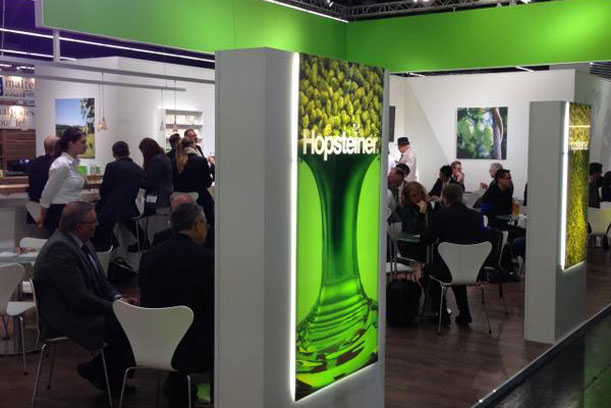 Signs of the beer times.
Signs of the beer times.
– Boston Beer co-founder Jim Koch delivered the keynote speech today at Brau Beviale in Nuremburg, Germany. It is a massive trade show. I grabbed a photo of the Hopsteiner booth off Twitter to illustrate the point. That’s one booth of hundreds. It looks like an airport bar.
Koch’s statement that “the Reinheitsgebot has served its purpose as a public health measure and it’s almost becoming like artistic censorship” is likely to be retweeted the most often.
But I was struck by something he said at near the end. “Hops will begin to be customized, even for an individual brewer and their needs,” he said. I would not be surprised to see breweries paying breeders and farmers to own the rights to particular varieties, but don’t expect many breweries to own their own — at least not ones you want added to your beer.
– The European Beer Star award winners were later announced at Brau. The competition is not as big at the World Beer Cup, but the quality of entries and the judging panel is damn near the equal. American breweries won plenty of medals, but although Firestone Walker captured four of them its India Pale Ale, Union Jack, finished second after winning the previous two years. Birra del Borgo, an Italian brewery (that should be obvious), won gold with Re Ale Extra.
– From the Triangle Business Journal: “Farm Boy Farms of Pittsboro – a local provider of barley, wheat and malt for craft beer – is doubling in size, which means more local ingredients could work their way into local craft beer.” Hops are sexy, so get most the attention, but local grains (which can then be malted; as you can see the writer might have a small problem with that concept) are just as important in making local beer. And managing them at the local level just as challenging.
– That the Cicerone Certification Program is giving an exam in San Antonio, Texas, next February merits a story in MySA.
Doesn’t Rogue have its own hops?
Curious timing. I’m reading “The Brewer’s Tale” and the author refers to Rogue’s “proprietary hops.” But they are simply public varieties with new names (which have been trademarked). I don’t know the exact code, but I’m pretty sure that Rogue’s Rebel is Cascade. They’ll be a little different than Cascade grown nearby, and quite likely noticeably different than Cascade grown in the Yakima Valley or in New Zealand.But while Rogue can trademark the name it would be impossible to patent them (proprietary hops such as Simcoe and Citra are patented).
“Koch’s statement that “the Reinheitsgebot has served its purpose as a public health measure and it’s almost becoming like artistic censorship””
Why not just leave the Germans alone?
I agree there has already been enough picking on the Reinheitsgebot, but this doesn’t feel like pouring it on. The crowd at Brau is international, but with a lot of Germans. And he was there to receive the Bayerischer Bierorden (Bavarian Order of Beer), the first non-German so honored in the 35 years the award has been handed out. He has an obvious affection for the German brewing community and this looks like friendly advice to me.
Point taken about Koch and his relationship with the Germans, BUT is there something wrong with German beer? I find the implication that ‘things would be better if you did it more like America’ and/or, ‘your beer could really be a lot better’, to be odd.
I don’t know that Koch was implying German should follow an American model, but you are correct that some people do seem to think that. Is it necessary to take a “BrewDog approach” or is it enough to be patient and count on internal change from brewers like those in Bier-Quer-Denker, a group of brewers who look both within Germany and beyond for inspiration? I vote for the latter.
Stan, respectfully, that’s not my point at all, rather it’s, why does German beer need to change at ALL (‘BrewDog style’ or ‘BQD style’)?
I find the implication that there is something ‘wrong’ with German beer ‘as is’ (that Koch CLEARLY does when uses the phrase, “artistic censorship”), to be annoying. Nothing is broken in German brewing, so there is nothing to ‘fix’.
Some people, including both German beer drinkers and brewers, want change, more choices. I was going to include a link a story that Sylvia Kopp (who is German) wrote for All About Beer in 2008, but it appears that only the first few paragraphs are now available. It makes the point quite nicely.
Also, they have the same problem (so a “what’s wrong” aspect) as every where else – mass produced beer sold based on price. In their case, no adjuncts – so it meets the Reinheitsgebot – but much different than many of the beers 100 years ago.
‘Change’ – perhaps the most overrated thing in beer, ever.
How about if it is phrased “some people want something different”?
Have ’em move to America!
Call me old-fashioned, but I don’t see how the corruption of a great beer heritage (Germany), when there’s plenty of corrupted beer already in the marketplace (USA), is a step forward. We have all the ‘artistic’ beer that we need thanks very much, without distorting and bastardizing the beautifully simplistic.